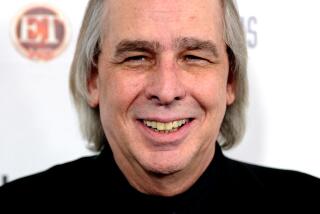There Has to Be a Spot on Dial for This Kind of Music : The Most Feared Words in Radio: ‘Format Change’
- Share via
Once again, that most frightening and heinous term in the radio lexicon has reared its ugly head: Format Change. This time, the local station undergoing a complete overhaul is KPCC, the much-loved FM station of Pasadena City College (“Morning Report,” Calendar, June 26).
For years the station has played a superb mix of what it billed as Classic American Music--everything from John Philip Sousa to Duke Ellington, with stops at Bessie Smith and Jimmie Rodgers in between. The big-band, cabaret, jazz and early R&B-dominated; sound will now be replaced by something called “Album Alternative Roots Music.” In other words--just what Southern California needs: one more rock station.
The irony, of course, is that “alternative” music is exactly what KPCC played. Rap and heavy metal and grunge (or whatever other fad is hot this week) are the ubiquitous soundtrack of the corporate mass media establishment. The Boswell Sisters and Fats Waller--now there’s a radical alternative! It reminds me of the aging crooner who said: “I didn’t mind when rock ‘n’ roll came. I didn’t even mind when it started to dominate, but did they have to take everything?”
The tragedy of this is that much of the music that KPCC played simply won’t be heard anywhere else. Sure, other public stations play a modicum of mostly contemporary jazz and blues, and somewhere on the AM dial, you’ll hear the likes of Frank Sinatra and Ella Fitzgerald (along with commercials and pap), but no other station in Southern California plays jazz pioneers like James P. Johnson, Meade Lux Lewis or Willie “the Lion” Smith. Not to mention those long-forgotten torch singers, such as Helen Morgan, Lillian Roth and Libby Holman.
Now along with their vaudevillian cohorts Cliff Edwards, Bert Williams and Fannie Brice, their vintage 78s are stacked on a dusty shelf perhaps never to be played again in this market. More’s the pity.
The host who best represented KPCC’s spirit of musical history as delightful melange was British pop star turned author Ian Whitcomb. His marvelous Wednesday night program was a consistently soothing oasis of civility, wit, charm and literary sensibility set amid a sea of ignorance, sleaze and hostility.
Where else on the L.A. dial could the names Noel Coward, Robert Johnson, Bertolt Brecht and Al Jolson all come up on the same show? And not in a forced or didactic manner, but with a casual holistic approach that had you convinced by the end of the show that Jelly Roll Morton, Graham Greene and Eddie Cantor really had a hell of a lot in common after all.
*
It was this thesis of connectedness that made Whitcomb’s show so compelling. The notion that ragtime offered a direct link to rock ‘n’ roll, and even that Irving Berlin was an early rapper, may not have been wholly substantiated, but it did at least allow us to ponder our intergenerational, interracial and intercultural links at a time and place when we are increasingly isolated along those very lines.
It is doubly ironic that Whitcomb’s show will be replaced by an undoubtedly harsher modern sound. Whitcomb would often point out how the great American music of the past, so joyous and life-affirming, was almost universally created by impoverished and oppressed blacks, isolated and looked-down-upon hillbillies and first-generation (mostly Jewish) immigrants struggling to survive. Now instead, we’ll likely hear the angry whine of the spoiled and bored contemporary middle class. This is progress?
In the end, what did in KPCC are those twin evils of contemporary America: Corporate Bottom Line mentality (even, alas, among the Corp. for Public Broadcasting) and our Cultural Amnesia--specifically the baby boomer/Generation X belief that anything that came before them is essentially worthless.
So, farewell, Mabel Mercer; adieu, Edith Piaf; and good night, Jimmy Durante, wherever you are. The barbarians aren’t at the gate anymore, they’re inside the castle running the show.
More to Read
The biggest entertainment stories
Get our big stories about Hollywood, film, television, music, arts, culture and more right in your inbox as soon as they publish.
You may occasionally receive promotional content from the Los Angeles Times.








